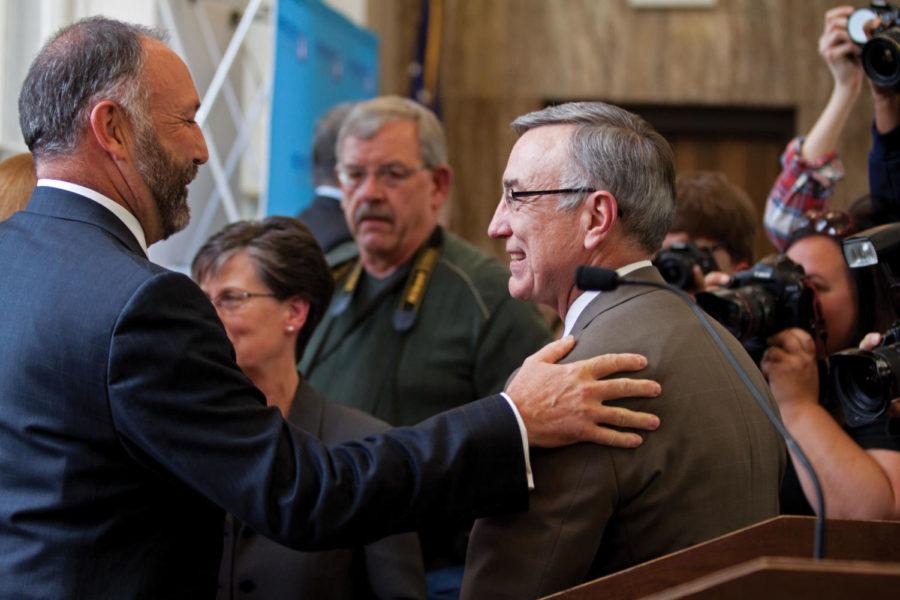Kruzic: Fear future of Iowa State under Steven Leath
Current ISU President Gregory Geoffroy and president-elect Steven Leath speak to each other after the announcement ceremony on Tuesday, Sept. 27, in the Campanile Room of the Memorial Union. Leath said he looks forward to working with Geoffroy in the transition.
October 7, 2011
Steven Leath was selected last week by the Board of Regents as Iowa State University’s 15th president. Leath, currently serving as vice president for research and sponsored programs at the University of North Carolina, assumes his appointment here at Iowa State on Feb. 1, 2012.
Leath, with three degrees in plant science, has occupied several positions throughout his career that, among other things, led to the Board of Regents’ decision to appoint Leath as the next president of Iowa State. Preceding his current position at the University of North Carolina, Leath served as associate dean of the College of Agricultural and Life Sciences and director of the North Carolina Agricultural Research Service. Prior to his posts at UNC, Leath served as research leader and plant pathologist with the United States Department of Agriculture’s Agricultural Research Service and an extension plant pathologist at University of Illinois at Urbana-Champaign.
Though he touts an impressive employment history, I worry about the selection of Steven Leath as president of Iowa State for several underlying reasons. By choosing Leath, the Iowa Board of Regents has taken a stance on the direction Iowa State will head in the coming years. The selection of a new president presents a new era for the state of Iowa; this era has some troubling characteristics. Two integral aspects of our university’s future — gender equity and accessibility in academia and allowing students an academic experience rooted in something other than science, technology, engineering and mathematics fields — are being ignored as issues of importance by Leath.
Craig Lang, president of the Iowa Board of Regents, said, “His specific experience with university research and technology transfer, and their application to economic development, will be an invaluable resource in leading Iowa State and its many contributions to the state of Iowa … ” Though “university research and technology transfer” is undoubtedly important, Lang seems to have forgotten something: Steven Leath’s concern for disciplines and the development of knowledge outside the areas of science, technology, engineering or mathematics is essentially nonexistent.
The development of students as informed citizens as a whole seems to be completely outside the realm of Leath’s vision for Iowa State. In an open forum hosted on Sept. 23, the ISU community was invited to address questions and concerns to presidential finalist Leath, and Leath’s disregard for an informed citizenry (unless of course you plan to spend your life in a lab) became painstakingly obvious. Leath stated that as a land-grant institution, we need to “train students that are employable.” Leath went on to explain that we need to train people to be “engines of innovation”; he sees prosperity in an innovation-driven economy.
Iowa State University is not a technical college. I did not choose Iowa State to be “trained” to be a good, profit-producing, abiding employee. On the contrary, students choose Iowa State to become productive, informed world citizens. We choose Iowa State to learn about the world and culture we live in, try new things and experience new perspectives and paradigms; it is through this process that we find a topic we’re passionate about and can eventually pursue a career in.
At college, we learn and grow as individuals and citizens — we don’t just get “trained” how to be employable; if students wanted that, we would have attended welding or mechanic school. If the state of Iowa would like a productive, informed citizenry, Leath must keep in mind that a well-rounded education is imperative; students must be offered well-researched and well-developed coursework in the arts, humanities and social sciences. Leath’s support must extend beyond science, technology, engineering and math.
Adding to Leath’s disconcern for a well-rounded education, Leath has communicated that gender equity is not an issue of importance at Iowa State. When asked about furthering gender equity at the Sept. 23 open forum, Leath brushed off the question by saying this has “become less of an issue than before … most of our students are female … ” Leath went on to say he is “increasingly concerned about the lack of males going to college … “
But Iowa State’s females represent only 43 percent of students. In fact, in the oh-so-coveted STEM fields, women at Iowa State represent only 31.5 percent of enrolled students.
In addition to the underrepresentation of female students, there is a gross inequity in faculty by gender as well. Only 25 percent of tenured faculty are women; 41 of tenure-eligible faculty are women, and only 25 of those tenure-eligible women actually receive tenure. In Leath’s beloved field of engineering, women represent only 7.8 percent of faculty. No matter how you look at it, Iowa State does not have an equitable distribution of women and men; it is essentially ridiculous for Leath to be even remotely concerned about the “lack of males” at college — this is simply not the case at Iowa State.
Lang has touted that Leath has demonstrated “extensive expertise in all areas that are critical to leading Iowa State University.” It is with the appointment of Leath as the 15th president of Iowa State that students and the state of Iowa must question the future of Iowa State.
If a leader has been chosen that ignores the importance of development of well-rounded educated students regardless of gender, what does the future of Iowa State look like to the Board of Regents? As assistant professor of educational leadership and policy studies Nana Osei-Kofi articulated, “As a public land-grant institution, we have a responsibility to educate the whole person, and this requires a commitment to thinking about knowledge and what it means to be an educated citizen, broadly.”

















